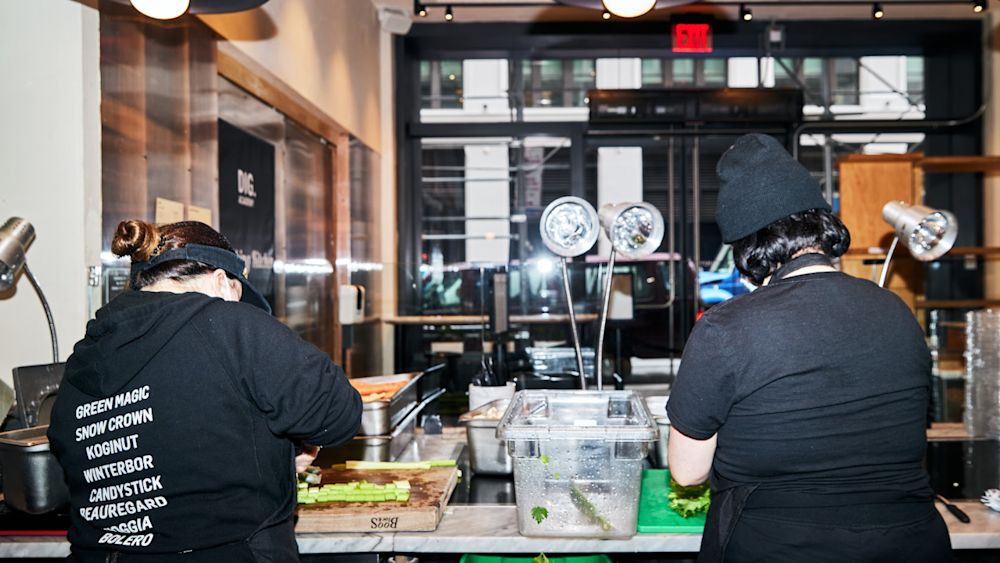- Iterate
- Meet The Team
- DIG’s Co-Founder on Sustainable Success in The Hospitality Industry
DIG’s Co-Founder on Sustainable Success in The Hospitality Industry
Table of contents
Two years later a pandemic-induced slump, VC-backed fast-casual brand DIG is focused on growth. The company's newest initiative: offering hourly employees a four-day work week.

Expected to reach $209.1 billion by 2027, the fast-casual market hasn’t slowed since it found success over a decade ago.
When Dig Inn was founded in 2011, it was coming up alongside industry powerhouses like sweetgreen and Just Salad. The appeal was universally fresh food made in front of you. But DIG, the company's name following a rebrand, focused on the customer experience of hospitality in restaurants. Backed by Danny Meyer and beloved by lunch break regulars, the chain has annexes in NYC, Boston, Brooklyn, Cambridge, Philadelphia and Rye Brook, New York. A pandemic-induced slump led to a 40% layoff and fundraising, but two years later, the brand is focused on growing authentically.
Just a month ago, co-founders Adam Eskin and Andrew Jacobson agreed to offer hourly employees a four-day work week, inspired by Boston-based DIG managers. “It became super clear that if we didn't [offer customized options], we were gonna end up pushing women of childbearing age, in particular, brown and Black women, out of the company, and that was not going to fly,” DIG’s VP of People and Culture Melinda Sharretts told Fortune.
Andrew Jacobson, co-founder and Labor General Manager at DIG, told The Org: “We believe the four-day workweek has a big future—not only at DIG, but in the hospitality industry, as a quality of life innovation.” For Jacobson, reimagining the future of DIG’s labor force, which happens to be its largest cost, has been an opportunity to consider “how to improve the jobs of the people who work in our restaurants.”
Scaling farm to table
Jacobson has credited a high performing restaurant team to the same three things since DIG's day one: ”being great with people, great at visual pattern recognition and great at interpreting data.” DIG’s fixation on local sourcing, accessible pricing and chef training has also grown with the company. What has changed is Jacobson’s college business plan to open a restaurant. “I am much happier being part of a team,” he shared. “I admire Adam’s (Founder and CEO of DIG) perseverance, creative thinking and boundless energy.”
A day in the life
A definite morning person, Jacobson has his best thinking and most steady energy in the early part of the day. “A couple years ago, I stumbled onto Gary Keller’s motto of 'having a great day by noon.' The idea is to devote the early part of your day to the highest impact tasks.” This includes protecting his schedule “ruthlessly” in the morning to allow for exercise and meditation. “The great thing about 'having a great day by noon' is that I can get comfortable with a little less efficiency after lunch which is helpful in the afternoon when my energy starts to wane,” he said.
Founders File Q&A
What's the piece of leadership advice you channel most frequently?
(First) seek to understand.
What's the most important thing you look for when determining whether or not a person is a good fit for the team?
I look for integrity, curiosity and humbleness.
What other role at DIG do you feel you can learn the most from?
For most of COVID-19, I’ve had to stay away from restaurants due to my family situation. Though I’m in constant communication with our restaurant leaders, it’s not the same as spending time in the restaurants, and working full shifts. Our restaurants have changed so much over the last two years and in the coming weeks, I’m excited to start spending time in them again.
What advice would you offer aspiring founders?
For most people, it is far easier to take a big swing on a new idea before you get married, have children, own a house or achieve a big salary.
Sign up now: Stay up to date, level up and hire better with our behind the scenes newsletters at the world’s top startups.


The ORG helps
you hire great
candidates
Free to use – try today